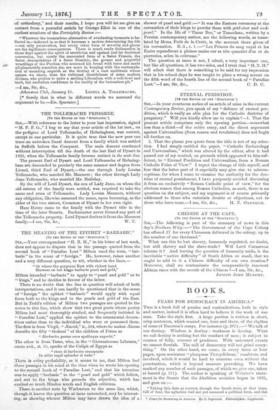THE MEANING OF THE EPITHET "BARBARIC." go THE EDITOR OF
THE "SPECTATOR."] -Sin,—Your correspondent "H. N. H.," in his letter of last week,
does not appear to dispute that in the passage quoted from the second book of "Paradise Lost" Milton used the term, " bar- baric " in the sense of "foreign." He, however, raises another and a very different question, to wit, whether in the lines,—
" Or where the gorgeous East with richest hand
Showers on her kings barbaric pearl and gold,"
Milton intended " barbaric " to apply to "pearl and gold" or to
" kings," and he decides in favour of the latter.
There is no doubt that the line in question will admit of both interpretations, and it can hardly be questioned that in the sense -of "foreign" the epithet " barbaric " would apply with equal force both to the kings and to the pearls and gold of the East. But in Todd's edition of Milton two passages are quoted in the notes to this line, which show that two great poets whose poetry Milton had most thoroughly studied, and frequently imitated in "Paradise Lost," applied the epithet to the ornamental decora- tions rather than to the individual who wore or possessed them. The first is from Virgil, " .2Eneid," ii., 504, where he makes Eneas describe the fifty " thalami " of the children of Priam as
" Barbarito postes aura spoliisque superbi."
The other is from 'fess°, who, in the " Gierusalemme Liberate," 'canto xvii., at. 10, speaks of the Caliph of Egypt as
" ricco di barbarize ornamento In abito regal splendor si vede."
There is every probability, as it seems to me, that Milton had these passages in his mind at the time when he wrote his opening
to the second book of "Paradise Lost," and that his intention was to apply "barbaric" to the "pearl and gold" which follow, and not to the kings who precede the adjective, which has -excited so much Hindoo wrath and English criticism.
There is another note by Warburton to the same line, which, though it leaves the question at issue untouched, may be interest- ing, as showing whence Milton may have drawn the idea of a
shower of pearl and gold:—" It was the Eastern ceremony at the coronation of their kings to powder them with gold-dust and seed- pearl." In the life of "Timur Bee," or Tamerlane, written by a Persian contemporary author, are the following words, as trans- lated by Mona. Petit de la Croix, in the account there given of his coronation. B. ii., c. 1:—" Lee Princes du sang royal et lea Emirs repandirent h pleines mains stir as tete quantite d'or et de pierreries, selon la coiltume."
The question at issue is not, I admit, a very important one, but like all questions, it has two sides, and I trust that "H. N. H." will admit that there is something to be said for my impression that in his school-days he was taught to place a wrong accent on the fifth word of the fourth line of the second book of "Paradise


































 Previous page
Previous page